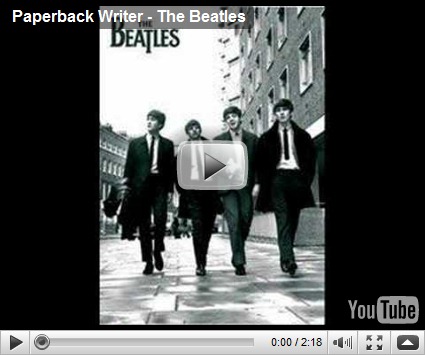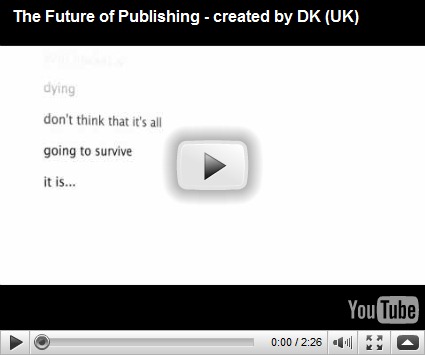To play while you read:
In the comments the other day, we were discussing the rise of digital publishing and there was a general consensus that printed books were not going to disappear soon. I thought about that as I read an interesting article in Smithsonian Magazine about the evolution of …Paperback Books. Until the 1930’s paperbacks did not exist as they do today. They existed but were used mostly for pulp fiction. No “regular” novels, even classics, were available in paperback. And then, along came Penguin Books.
The story about the first Penguin paperbacks may be apocryphal, but it is a good one. In 1935, Allen Lane, chairman of the eminent British publishing house Bodley Head, spent a weekend in the country with Agatha Christie. Bodley Head, like many other publishers, was faring poorly during the Depression, and Lane was worrying about how to keep the business afloat. While he was in Exeter station waiting for his train back to London, he browsed shops looking for something good to read. He struck out. All he could find were trendy magazines and junky pulp fiction. And then he had a “Eureka!” moment: What if quality books were available at places like train stations and sold for reasonable prices—the price of a pack of cigarettes, say?
A weekend in the country with Agatha Christie? How murderously delightful!
Lane formed Penguin Books himself when no publishing house would back him. It was a successful venture. Looking at it with 20/20 hindsight it seems clear that paperbacks would be popular. Well, why wouldn’t they be? They could not only be sold at railway stations and the five and dime stores, they were more lightweight than hardbacks which made them perfect for commuter reading in a country that relied on trains. And look at who they were publishing:
The first ten Penguin titles, including The Mysterious Affair at Styles by Agatha Christie, A Farewell to Arms by Ernest Hemingway and The Unpleasantness at the Bellona Club by Dorothy Sayers, were wildly successful, and after just one year in existence, Penguin had sold over three million copies.
Soon a similar venture was tried in America. The advent of World War II made the industry grow because paperback novels were easy to distribute to troops during wartime and easy to carry around. Today paperback versions of novels are ubiquitous.
Personally, at this point I prefer paperbacks although I read a lot of hardbacks. I like to read some authors immediately without waiting for the paperback version. I also use my public library and they buy books as soon as they are published, which makes for a lot of hardbacks. So I lug around hardback editions all the while wishing I had a paperback edition.
Hardbacks last longer, it is true. But hardbacks seem to be designed for people who have the luxury of reading at home, in a comfortable chair under a good reading lamp. They are not good for lugging around in a purse to be read between bites at lunchtime. Or to be read in a car as one sits through very long stoplights. They are not even very good for reading in bed (I sometimes had a fear of breaking my nose when I tried to read my hardback copy of War and Peace in bed and wold start to fall asleep.) And there is a psychological reason I like to carry paperbacks around - I don’t feel as bad if I bang them up as I would if they were hardbacks.
On the other hand, even paperback versions of long books are hard to lug around. It took me forever to finish Anna Karenina because I had no reading plan and I found it too heavy to easily carry around with me and read as the spirit moved me. Right now I’m reading 2666 in paperback and it too is heavy to easily lug around, although I do.
I’ve been thinking a lot about the virtues of a Kindle these past few months. Since I took my sabbatical from all my reading groups, I’ve used my new freed up time to read some very long books. I’ve finished War and Peace (over 1000 hardback pages) and An American Tragedy (over 800 paperback pages). I’m reading 2666 (about 900 paperback pages) and Lindsey Davis’ Rebels & Traitors (about 800 hardback pages). Even the shorter books I’ve been reading haven’t been all that short. I just read The Glass Room by Simon Mawer which was over 400 paperback pages. And I’m working on Byatt’s The Children’s Book which is almost 700 hardback pages. The last two I read at home so it isn’t so much of a problem. But the others … a Kindle would have been nice. On the other hand, 2666 and Rebels & Traitors aren’t available on Kindle. What’s up with that publishers? These type of long books seem ready made for carrying around digitally.
For what it is worth, my prediction is that hardbacks are going to be phased out. They will still be available in special editions for collectors, so they won’t disappear entirely. But I think we are going to see a world dominated almost completely by paperbacks and e-versions of books. Even brand new novels by big name authors of literary fiction will eventually stop coming out first in hardbacks. And paperbacks will be purchased by people who want to read at home or who rely on the library or book sales, the way hardbacks are now. The same “Eureka” moment that Allen Lane had back in the 1930’s applies to e-books today: “What if quality books were available at places like train stations and sold for reasonable prices—the price of a pack of cigarettes, say?” Once you get past the cost of the reading device, this is happening today. Quality books are available wherever you happen to have access to an internet connection and, although the cost is more than a pack of cigarettes, it is still relatively cheap.
h/t: Mark Athitakis



